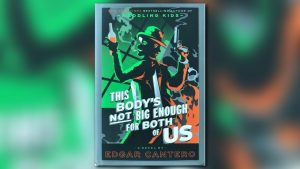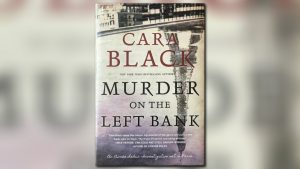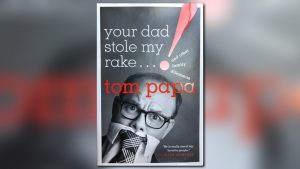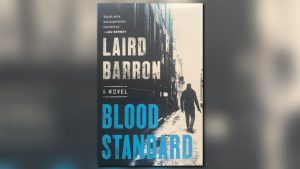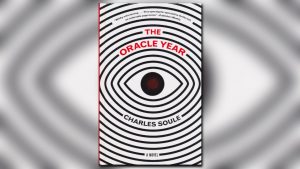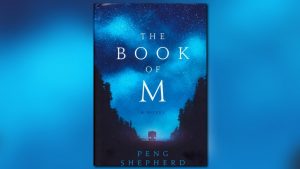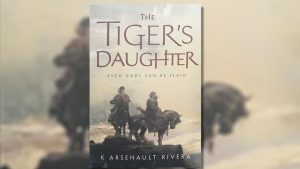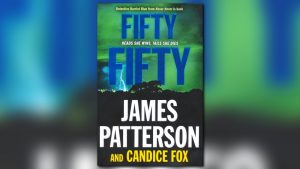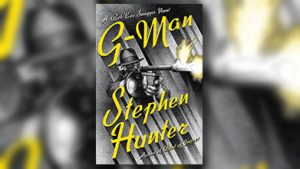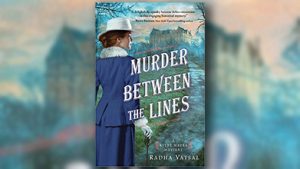The Bone Tree is the second installment of the Penn Cage trilogy.
It follows former prosecutor, Penn Cage, on his journey to save his father, Dr.
Tom Cage who is fleeing a murder charge and corrupt cops who plan on killing him.
Whilst, Caitlin pursues unsolved civil rights cases that lead her into the forest near the backwaters of Mississippi River to a place called “the bone,” which was a secret killing ground used by slave owners for two hundred years.
Follow this action-filled thriller that highlights dark American history truths.
VOICE OVER: And now, an Eight original production. Books & Co. is made possible by the Department of English at Arizona State University and by the Friends of Eight, members of Eight, Arizona PBS, who give additional gifts to support original programs. Thank you.
ALBERTO RIOS: Welcome to Books & Co. Bienvenidos, todos. I'm your host, Alberto Ríos and we're joined today by New York times best-selling author Greg Iles, talking about his latest book, "The Bone Tree." Welcome, Greg.
GREG ILES: Glad to be here, Alberto.
ALBERTO RIOS: I have to say this book was quite a wonderful book to read. I know it's part of a series and we'll talk about that. So as I opened the first page, and starting with the first page, I felt like I was thrown into the deep end of a swimming pool and that a fifty-pound weight was thrown in on top of me and I had to do all this movement to catch up but I didn't connect it to a book before this. It was just the job of taking care of business, reading this book, it gave me energy, it gave me movement, it gave me feeling and it continued all the way through. I compliment you on that. I think that was quite a wonderful way to start this book. Maybe you could start by giving us a synopsis of this book, both it specifically and the series.
GREG ILES: I think the best way to put it is to say it's not technically a series, it's actually a trilogy which in adult main stream fiction you would almost never see in the sense that the books do not technically stand alone. One might disagree, we could argue it could be read alone but to get the full sweep of the story, you need all three novels. It's a story on two levels and in two times. At its most basic level, it's the story of a father and a son. One critic I think put it best when she said imagine Jim Finch grew up to learn things about Atticus that no son should ever know about his father. I think that puts it well. And then the larger canvas is pretty thinly veiled expose of some real-life civil rights murders down in my part of the country, the Mississippi River, Concordia Parish, Louisiana, Natchitoches, they were tragic murders and sadly, they have a lot of relevance today.
ALBERTO RIOS: And a lot of them unsolved.
GREG ILES: Yes, all unsolved.
ALBERTO RIOS: The scope of this book, I mean especially for history buffs, it has everything in it! And more. And I just wonder how you start to think about striking a balance between history, those things that we presume to be factual, though clearly, a book like this helps us to understand that fact is only as good as that day's newspaper, and story.
GREG ILES: Well, you know, I began my career writing about the Second World War. I was born in Germany, though, I was raised in the South, and with one book, “Black Cross,” I sort of earned my bones there. Very tightly woven together historical mystery and possible alternate realities that led to the history that we knew. It was something I liked to do. I've tended to write all over the genre map, usually a thriller or a mystery but about a lot of subjects. Artificial intelligence, repressed memories of child abuse, but when I came back to these crimes, I knew I was going to be walking a tight rope between what was known in terms of evidence of the actual crimes, larger crimes that take part in the American culture like the Kennedy and King assassinations, just a very broad tapestry that I was going to have to weave in and out of constantly but it's a fun challenge.
ALBERTO RIOS: It's interesting, too, to see story take over. We might have a sociological reaction to these things but each of these characters has his or her own reaction, which is very personal.
GREG ILES: And the job of the author I think is to put the reader into the skin of those characters. I've never been, for example, this book does digress into the Kennedy assassination to a degree. I've never been a Kennedy conspiracy buff or anything like that. It's just that the story and the characters led me there. For example, the character Ray Presley who's mentioned in this book, I can say this now, he was based on a patient of my father who was a police detective, he had been a cop in New Orleans in the pay of mobsters, he had some of the records of Jim Garrison from the Kennedy investigation. That guy took me on a tour of New Orleans that led from mafia hangouts into some of the highest political offices in Louisiana in one day and I discovered just how porous the border between legal and illegal is.
ALBERTO RIOS: And what we know and don't know and what perhaps nobody knows.
GREG ILES: Absolutely.
ALBERTO RIOS: I think all those elements are alive in this and they get passed around. I think I know, I think I know, I don't know anything. And each character goes through that transition as we go through it. You've got this main character who's not simply the mayor but also, a novelist. Where does that character come from, I wonder?
GREG ILES: You know, people ask frequently is Pen Cage based upon me? He's really not. He's began as a Grisham-esque character. Idealistic young lawyer, Caucasian, the world in front of them, more conservative than was good for him but the good thing about that is I've been taking him through an arc of disillusionment and complexity. So if you'll notice, he's more of an observer and analytical character than an action hero and as far as him being the mayor, he does I think represent me to a degree there in the sense of he's a member of a small southern town who's doing all he can to help preserve and save that town, and that's a tough battle to fight.
ALBERTO RIOS: It's also interesting, he gets more complex, if we can imagine him as the protagonist, I think the point of view shifts quite a bit but I think he is the reasonable protagonist of the story. He doesn't always make the best choices, and some of those human reactions that he has I think add to the story, with some great substance.
GREG ILES: I hope so. I hope I've learned over the course of my career that being authentic, I think the reader can relate much more to an authentic human, three dimensional character than an archetypal hero.
ALBERTO RIOS: He's not a superhero for sure. Nor is anyone!
GREG ILES: Right.
ALBERTO RIOS: And I think that actually adds to this, as well. What makes somebody good versus somebody bad? That's so easy to say in words but in practice, we start to find that they are inextricably bound.
GREG ILES: Always. Even the people we put on the highest pedestal, and I think that's in a sense at the deepest level that's what the story is about. We all grow up hopefully if we're lucky idolizing our parents, we tend to worship them, for boys it tends to be the father and you may be when this happens or you may be but inevitably the day comes when you find out that parent is as human as you are and that can be a tough day.
ALBERTO RIOS: And the protagonist goes through it as well, him personally.
We don't simply as readers go through that I think, though I think we're experiencing it and I think we register that moment of understanding but he goes through it and actually a number of characters go through that. There's a lot of people related to other people here.
GREG ILES: It's the South.
ALBERTO RIOS: That is actually also another complicating part of this is that it's not just players in a stage play. It's relatives, it's cousins, it's brothers, it's all that sort of stuff which I think changes the nature of how we might do what we do.
GREG ILES: Absolutely it does. We never -- we never act objectively or even rationally when family is involved and I would extrapolate saying the same thing about the milieu of the book, of the South. When I'm home in Mississippi I'm one of the most vocal critics of the state but if I'm elsewhere, California or Detroit, I might punch somebody out. It's okay for you to talk about your brother or your cousin but nobody else has any business doing that.
ALBERTO RIOS: Let me ask you what brings you to this character, Pen Cage. You have some things that have led you on this narrative trail.
GREG ILES: I think what brought me back to Pen, in his first book “The Quiet Game,” I never had any intention of him being a serious character. It just was one-off and my books, I've never believed in the series. I liked to go through the watershed moment of somebody's life, deal fully with it and move on but somehow because pen had so many similarities to myself, every seven years or so I would be drawn back to that and as I said since he's an observer and an analyst sort of like myself, he was just a good lens through which to view all these events.
ALBERTO RIOS: Well, and as an observer and analyst, you're writing a long, a long arc. How do you pace yourself? Aren't you tempted sometimes to jump ahead?
GREG ILES: I am. The crazy thing about the first two books of this trilogy, 1,600 pages and it really encompasses about eight days. Now think, you could do, you know, multigenerational sagas in 1,600 pages and I cover eight days. That's something I like to point out about writing. People tend to not understand this about writing, what a critical element time is. Like I've written a couple of books about World War II. Let's say I wrote a novel of 400 hundred pages that covered 1939 to 1945. I could also write a 400 page novel about World War II that covered 19 seconds on Omaha Beach. That's how elastic time is in the process of writing novels. And so you ask a good question Well, in this, I decided to tell the stories in a very granular way, a very emotional way, second by second, and once you're committed to that, there's almost no escape hatch to get out.
ALBERTO RIOS: Time is not the measure of experience, it's however, we register that experience I think. I think that's part of it. Well, I said this book has everything in it and it does,
JFK’s shooting, MLK’s shooting, Robert Kennedy's shooting, the mafia, World War II, World War I, it's got Vietnam, it's got a little bit of everything, including the civil rights struggling South.
GREG ILES: Yeah.
ALBERTO RIOS: Along with that, you've got characters who are very real, we know them from history and then beyond that you've got some of those characters speaking.
GREG ILES: Yes.
ALBERTO RIOS: How does that work? You have Fidel Castro speaking.
GREG ILES: It takes a certain amount of hubris. I got used to in that my World War II novel where I had six chapters from 1945 where I had Hitler on stage, so I got accustomed to that. That doesn't spook me. I think that's where you have to be confident, your research is as good as a historian's, hopefully. The trick is to make those people live in a way that people, the reader buys it, and the willing suspension of disbelief is reserved.
ALBERTO RIOS: How do you know that the research you did is any more true than anything the characters were saying? That's got to be a tough call sometimes.
GREG ILES: Well, where I can, my research is first-hand from actual people. Obviously, people are only as good as what they believe to be true. But at a certain point we have to accept something on its face, you know. And I feel pretty confident that, for example, the alternate explanation put forth for Kennedy's assassination, if Oswald did not act alone I'm pretty confident this is the scenario that happened and I found out --
ALBERTO RIOS: You're going to feed that fire, too.
GREG ILES: I found out Dennis Lehane believes that and some other people, I had no idea subscribed to the same theory.
ALBERTO RIOS: That's funny because you articulate it quite persuasively here.
GREG ILES: I hope so.
ALBERTO RIOS: That's going to add to it, and I think that you add the element of things that we've peripherally understood to be part of the deal, the mafia, for example, Marcello specifically. They come alive here in ways that seem reasonable, could have happened and you even suggest they did happen.
GREG ILES: I think people don't understand, when we study history, we make the mistake of putting a scrim between us and the people who were primary actors in the events. We lose sight of the fact that they were flesh and blood people just like us, subject to the same urges, fears, insecurities. Once you accept that, I think it can give you a straighter through line to what might have happened.
ALBERTO RIOS: I'm going to take just a moment to remind our viewers you're watching Books & Co. I'm your host Alberto Ríos and we're joined today by Greg Iles talking about his latest book "The Bone Tree." And as I was saying, it's positioned in the middle of a trilogy. That's a very special place. It's like a middle child. And when I had read that coming in, I wasn't sure what to expect. But I have to say it is a masterpiece of plotting. That is to say I want to turn that page virtually the whole way through this.
GREG ILES: Good.
ALBERTO RIOS: How do you do that?
GREG ILES: That's sort of always been, in all humility, that's been my gift was plotting. I think the best way for people to understand this book is this I first attempted to tell this story in a single volume. I owed the company a novel, and as I was coming to the end I realized there's no way this epic story is going to be held within a book. They weren't happy with that idea. And right about that time I pulled on the highway 61 and a truck hit my driver's door going 70 miles an hour, took my leg off, tore my aorta, smashed many, many bones and when I woke up from the coma from that accident, I no longer cared whether or not it hit any conventional template, what my publisher, agent thought and I was that sort of brush with mortality that made me say whatever the form is, we're going to discard everything and I'm going to tell the story. I didn't think of this even as a middle book. I simply told the story in its entirety and it wound up 2,200 pages and then the job came to find arbitrary dividing points that would not seem arbitrary. From the craftsman point of view, that was the challenge.
ALBERTO RIOS: That's the personal price to pay for the freedom of that epiphany.
GREG ILES: Because I was writing about family, tom cage was based on my father, race in the south, serious as subjects as you could take up in America. I thought maybe it took bean shaken that profoundly to say I'll just let the chips fall where they may.
ALBERTO RIOS: One of the things that happened to you is there's almost a choreography or a ballet at work, and it's a ballet, not of fears, but of entanglements, so that as I'm reading something I'm going, so long as they don't go into the swamp, it's okay, next page they're going into the swamp. There's a ballet of back and forth and there's a wonderful moment where a character named Mose speaking in dialect says there's always something dead down in here. He's talking about the swamp. Half this swamp is dying and decaying while the other half is growing so fast you can almost see it. You have to come down here at night sometimes, those logs, there's logs glowing under the water like the bodies of dead men looking up at you. You know, Yin and Yang, good and bad, hot and cold, it is all at work and I don't think you ever rest easy with one side of that or the other.
GREG ILES: I think that gets it, something you said earlier about the sort of trying to classify characters as good or evil. What this novel I hope it gets across is what you said, the eternal tension between dark and light, yin and yang, positive and negative, no one we know, including ourselves and nobody knows that better than ourselves can be considered categorically good, evil, and actions very rarely purely moral and that's the playing field of the good novelist, the serious novel cyst to delve into that gray area where we all really live. The comforting fiction to read is the fiction where an old British cozy is comforting, to know she'll figure out the killer in the end.
ALBERTO RIOS: They're not like that and I can say from reading this, sometimes shockingly not like that and it is a testament to the truth of story, not the theatricality of it. There's a number of things that work, too, and I'm going to ask you a few quick personal ones. You have Mose there and he's talking about these logs glowing, Moses and the burning bush, the connection with that name and one other name that I want to bring up was Walt Garrity and standing there like a tired old cowboy. The full-back from the Dallas Cowboys. I don't know how that happens to us as writers but you just draw on these or are you doing it purposefully?
GREG ILES: Think of that and the old Frederick Remington statues. I think we have -- if we grew up in similar generations, we have sort of the same cultural buttons. I think Steven king was one of the first guys to start arbitrarily pushing those buttons and therefore, with fewer words you get such a deep reaction.
ALBERTO RIOS: It's true. You invoke something in the reader beyond the story and that was really a great way to feel about a moment.
GREG ILES: Good.
ALBERTO RIOS: You bring something, and it's peripheral to the story. You're not the reader trying to write the story, you're just connecting to something. Anyway, you have a lot of technology in here, which has got to be a little bit new, the technologies have changed and the GPS trackers, the burner phones, all that stuff. These are new.
GREG ILES: I'll tell you the biggest challenge about technology really is this. For suspense authors, think of how damaging the cell phone alone is to plot. In the old days, it was very easy to put people in jeopardy. Now, everybody's in communication with some safety net at all times. It's very tough to put people in a situation where they have no believable avenue of escape.
ALBERTO RIOS: No bars.
GREG ILES: As they say. The swamp will do it.
ALBERTO RIOS: The swamp will do it. It's true. You have a kind of justice of a kind going on here. It is different each time, there's no hard and fast rules like the characters, it's not good or bad justice. It just seems like justice of one sort or another keeps happening. You've got all these sociopaths on the one hand and people trying to correct that on the other. But the nature of justice comes into question here, and it's an intriguing one.
GREG ILES: I think that's really sort of a primary American question there and that is when you really are confronting people who do not play by the rules at all, how bound are you to the idea that you need to try to be legal in your pursuit of justice, you know, or moral? Because I think the truth is when an average person really is confronted, truly confronted like, for example, the African-Americans who lost family members in the sixties. They were being -- Frank Morris was the basis, fire bombed, took him three days to die. I asked a reverend down there who was 100 years old why didn't you guys hit back offensively and kill some of the people who were doing this? And he had to think about it and he said I think we understood at some level that had we done that, it was like Nazi German or an occupied country. Had we done that, we would have lost ten for every one we did. So they can't make that choice but I think people like Pen Cage have a chance to say well if I have to take the law into my own hands I will. If I feel justified. I think that's just a streak in the American character. It's not always a good one but it's something, it's there.
ALBERTO RIOS: And that particular issue is raised a couple of notches in the struggle with nonviolence. And you have this particularly made clear near the end of this novel in the sermon that the preacher gives in the black church. That wrestling. And he says -- I think that's where it is. And he says some things, maybe you could talk about that particular sermon that I think are just special.
GREG ILES: Well, I think he comes down pretty much on the side of the idea, his belief that the pen is mightier than the sword or that nonviolence is the higher moral path. It's sort of a Gandhi-esque position but I would say from the pastor I mentioned a moment ago, had a very similar attitude. I think it's forbearance and intestinal fortitude and the belief that eventually if you can hold to that path, you will triumph. I don't necessarily agree with that. I don't think a lot of us would. But I saw that, I was privileged to see that in the South. I mentioned before the broadcast, when the African-American woman who raised me died who was our housekeeper, it's an irony of the South that a lot of the leaders of the South and some of the most moral guys I know actually got their system of ethics from African-American maids who raised them. That is a strange irony and someone should really study it. But back to the nonviolence thing, I think in some of the sermons I was privileged to hear at funerals I've been to in black churches, that strain is there, and I would say that is an empirically Christian position in the best sense. It's the hardest path to walk but it's been proven it can work.
ALBERTO RIOS: And we as readers go through that where it feels good to react to something and yet you have a whole group that says we're not going to do that and so with the mind you're going, yeah, and with the body you're thinking something else. If you can make that statement.
GREG ILES: Right.
ALBERTO RIOS: There is -- we're getting to close to the end here. When I read books I like to look for a thesis statement moment or something that is the book and I came to it right here I think. It's where the nurse says, “You got to open your heart to let the pain out. Ask any nurse. She'll tell you. Doesn't matter what you're talking about. Better out than in.”
GREG ILES: That was said to me when I was in intensive care unit after my accident by an African-American nurse actually. I won't say what it referred to exactly but I think that philosophy is a good one. I think we're in the Jungian sense we're poisoned by the things we keep in. You've got to confront the dark things that are within you or they'll destroy you. And since we're close to the end one thing I do want to bring up. These things you brought up I
think are the things that are responsible that this series is going to be a TV series and a lot of people will get to enjoy this. My previous novels have been too long, too complicated, too internalized but the content of this book, the trilogy that it confronted race so squarely and these issues, for a hero, is he going to be violent, is he going to take a higher road, that drew A-list actors and producers to it and I've got to say, I'm a child of the book, and I will always worship the book but we live in a time sadly where I think the screen is the dominant American art form and so I'm going to take a chance at making that transition.
ALBERTO RIOS: I'm glad to hear it. I think this book is suited to that but I would say that eulogy also says something about the writer and the reader and about as you say being a child of the book. There's something there, and it's beyond television or the screen or something else. It's something internal to us, not external to us, not something we're seeing out there. Something we keep inside.
GREG ILES: The other thing that comes out in that church I think and this is where my father is present in the thing and here's a guy who's a physician who quietly ministered to the African-American community all those years, frequently didn't charge, so when a guy like that after 30, 40 years comes under scrutiny for a violent crime against an African-American, that loyalty is there and that community to the things he speaks to in the church as well to say I don't care what circumstances may be, we know who's good, we know who cares about us.
ALBERTO RIOS: And that bears great fruit. I want to thank our viewers for joining us today. You've been watching Books & Co. I'm your host Alberto Ríos and we've been joined today by Greg Iles, talking about his latest novel, "The Bone Tree." Please join us again next time when we'll be bringing you another good book. Greg, thanks.
GREG ILES: Thanks, Alberto.
VOICEOVER: Books & Co. is made possible by the Department of English at Arizona State University. And by the Friends of Eight, members of Eight, Arizona PBS, who give additional gifts to support original programs. Thank you.





